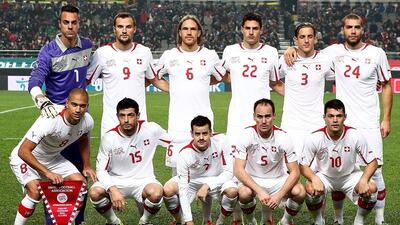A young side drawn mainly from immigrant backgrounds, Switzerland’s World Cup team is about as far removed from the stereotyped image of the Alpine nation as it is possible to get.
While the Swiss are often regarded as reserved, diplomatic and predictable, their national side is a feisty outfit with a surprising amount of flair.
Stephan Lichtsteiner and hard-tackling captain Gokhan Inler never shy away from a battle while the impish skills of Xherdan Shaqiri could make him one of the finals’ most exciting players.
The make-up of the team has changed beyond recognition over the past few years as the national federation, which runs one of Europe’s most impressive youth development programmes, has tapped into the potential offered by Switzerland’s immigrant communities.
More than half the squad hail from immigrant backgrounds. Many are from families who fled to Switzerland from Kosovo during the 1990s while midfielder Gelson Fernandes was born in the Cape Verde Islands and Johan Djourou in Ivory Coast.
Although they missed out on Euro 2012, when the team was in a transitional period, Switzerland will be going to their third successive World Cup, an excellent record for a small country, especially considering that football is less popular than ice hockey and alpine skiing.
Under former Bayern Munich manager Ottmar Hitzfeld, their prospects are better than at the previous two tournaments and they should be a far more entertaining proposition than their dour, defence-oriented predecessors.
They open their campaign against Ecuador in Brasilia on June 15, then meet France in Salvador on June 20 and Honduras in Manaus on June 25.
As nearly all of their players are based in top European leagues those matches will not unduly faze them.
Full-back Lichtsteiner is at Juventus, Napoli boast the midfield trio of Inler, Blerim Dzemaili and Valon Behrami and the Bundesliga contingent includes Djourou, Shaqiri, goalkeeper Diego Benaglio and midfielder Granit Xhaka.
Switzerland may have problems at the back where Philippe Senderos and Djourou have struggled for form at their clubs.
They are prone to lapses, such as squandering a three-goal lead in a 4-4 draw at home to Iceland, but young forwards such as Josip Drmic and Admir Mehmedi offer energy up front.
Hitzfeld’s team went through an admittedly easy qualifying group unbeaten and, with England, are one of only two teams to have beaten Brazil since Luiz Felipe Scolari took over as coach in November 2012.
Even if they go out in the first round, Switzerland should certainly provide more entertainment than in 2006, when they became the only team in World Cup history to be eliminated without conceding a goal, or 2010 when their three matches produced just two goals, one for and one against.
Going further back, Switzerland acquitted themselves well enough when they took part in the 1950 World Cup in Brazil.
Although they lost 3-0 to Yugoslavia in their first match they held Brazil to a 2-2 draw in their second game at Sao Paulo, a result that prompted some fans to attack the Brazilian coach Costa after the match, incensed that Brazil had allowed the Swiss a late goal to deprive them of victory.
The Swiss then beat Mexico 2-1 in their final game and were officially placed sixth at the end of the tournament, missing out on the final pool, which ended with Uruguay beating Brazil 2-1 in the decider.
Five to watch:
Stephan Lichtsteiner, right-back (Juventus); age 30; 61 caps. Nicknamed "Forrest Gump" thanks to his storming runs down the right flank, the feisty right-back completed an apprenticeship in banking when he was a young player at Grasshoppers Zurich. Has won successive Serie A titles with Juventus since his move to Turin in 2011. Plays on the flank of a five-man midfield for his club and at right back of a four-man defence for his country.
Tranquillo Barnetta, midfielder (Eintracht Frankfurt); age 29; caps: 73. An attacking midfielder who has scored 10 times for Switzerland, he is set for his third World Cup having recovered from a knee injury that sidelined him for six months in the 2011/12 season. He missed during the penalty shoot-out defeat to Ukraine in the second round of the 2006 World Cup, spoiling an otherwise excellent tournament. Raised at St Gallen, he has been in the Bundesliga since 2004 playing for Bayer Leverkusen, Schalke, Hannover and Eintracht Frankfurt.
Valon Behrami, midfielder (Napoli); age 29; 46 caps. Kosovo-born player who moved to Switzerland at the age of four, Behrami has raised a few eyebrows among the reserved Swiss squad with his tattoos and ever-changing haircuts. Happy at right back or in midfield, Behrami, who suffered a nasty knee injury during a three-season spell at West Ham United, has revived his career since joining Napoli in 2012. Harshly sent off against Chile at the 2010 World Cup.
Gokhan Inler, midfielder (Napoli); age 29; 71 caps. A fiercely-competitive, hard-tackling midfielder, Inler summed up his philosophy by turning up at his official Napoli presentation wearing a lion mask. The captain, an excellent long-range shooter, also played at Euro 2008 and the 2010 World Cup. He has been in Serie A since 2007, spending four seasons with Udinese before moving to Napoli in 2011. He played for Turkey's under-21 team before choosing to represent Switzerland, where he was born.
Xherdan Shaqiri, midfielder (Bayern Munich); age 22; 31 caps. One of the most exciting players ever to have come out of Switzerland, Kosovo-born Shaqiri can play on either flank and is always a threat with his powerful shooting and good crosses. He moved to Switzerland as a child because of the war in his homeland and joined FC Basel's youth academy at 10. Joined Bayern in 2012 and was part of their treble-winning team last season.
Follow us on Twitter @SprtNationalUAE

